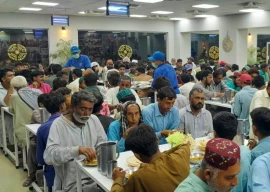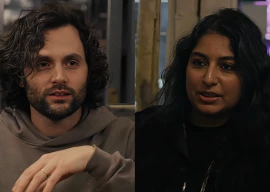
To recapitulate the facts of the case: In June 2002, a local panchayat or council of tribal elders met in Meerwala, southern Punjab, to settle a dispute between the Mastoi and Gujjar tribes. The powerful and politically well-connected Mastoi tribe had accused Shakoor, the 11-year-old brother of Mukhtaran Mai, of having illicit relations with their sister, Salma. Shakoor had reportedly been sodomised in the fields by henchmen of the Mastois and was terrified of reporting the crime for fear of being killed or further molested. The jirga offered four kanals of land and a watta satta marriage between Mukhtaran and one of the Mastoi men, in exchange for Salma’s marriage to Shakoor. The Mastoi tribe refused to accept the settlement and, in view of hundreds of people, four men dragged Mukhtaran Mai into a room where she was raped.
The FIR of the sordid incident was filed much later because of fear of the power of the Mastois and their influence over the police, local administration and the nazim. Nevertheless, once the case was widely reported and human rights organisations raised a hue and cry, an anti-terrorism court convicted six men and sentenced them to death. Nine years after the horrific act, the Supreme Court has held only one accused responsible, based on his confession, and five others have been let off the hook. The reasons cited is insufficient evidence because of the lack of a thorough investigation of the case.
It is obvious that multiple crimes were committed, including sodomising Shakoor, forcibly abducting Mukhtaran, gang rape, the holding of an illegal jirga and offering a settlement that asked a woman to pay for her young brother’s alleged crime, and pressure by the nazim on the police to go easy on the Mastois. Media reports suggest that the nazim needed the support of the Mastoi clan in the upcoming elections. In spite of an array of crimes and corruption, only one man was convicted for one crime. No one was held accountable for any of the other acts.
It has once again become evident that a politico-legal system that derives its power from a skewed and unequal socio-economic system cannot provide justice to its citizens. Our lawmakers are by and large derived from the very clans, tribes, castes, and feudal and Sardari systems that promote and justify a primitive notion of revenge based on an eye for an eye. A large number of our parliamentarians are drawn from social structures that regard women as property that can be exchanged for dispute settlement. They rely on alternate dispute resolution mechanisms (jirgas, shuras, panchayats) at the local level and express a haughty disdain for the legal-juridical-political system. This is why Mir Hazar Khan Bijrani presided over a jirga that offered girls aged two to six as peace offerings in a tribal dispute. And this is why Israrullah Zehri could claim that burying women alive is an age-old local tradition which should not be challenged by the legal structure of the state.
Our executive arm, entrusted with the task of executing the will of the parliament and implementing its laws, is also drawn from the same parliament. It, too, represents the same social structure along with its attendant values and ideologies. This is why Israrullah Zehri and Hazar Khan Bijrani both became federal ministers despite their despicable beliefs and practices. The ruling parties invariably need the support of the local feudal or tribal power structure to form coalition governments because of the increasing ethnicisation of politics wherein no party receives simple majority as voting has become ethnicity-based. When military governments are in power, they too resort to the support of the feudal-tribal elite to form a ‘king’s party’ and remain in power. In turn, the clout of the tribes, clans, castes and the power of the feudal overlords receives a boost in the form of ministries and other high positions.
With the legislature and the executive dominated by values reflecting feudal and tribal structures, the third part of the trichotomy, the judiciary, cannot remain immune to these influences. In spite of being generally better educated than the feudal and tribal representatives in parliament, the judiciary also comes from the culture of values and beliefs created by a feudal and tribal ethos. The judiciary, despite the requirement and rhetoric of objectivity, neutrality and impartiality, cannot remain unaffected by the dominant values produced by the socio-economic system. Members of the judiciary frequently belong to the same clans, castes, biradaris, zaat and tribes that comprise the local power structures. Additionally, they are constrained to give judgments in line with the laws made by parliament and a constitution also drawn up by those belonging to the dominant socio-economic system.
The modern politico-legal and juridical notions of neutrality, impartiality and objectivity seem to clash with the more personalised and primitive ideas of revenge on which the social and economic system is based. Since the personalised cultural structures are deeply patriarchal and caste-class based, there is little hope of a Shakoor or a Mukhtaran Mai getting justice. The powerful tribes like the Mastois will invariably prevail over the Gujjars and women’s rights and freedoms will be subjected to male whims. There is a mismatch between the socio-economic system and the political one based on democracy. As long as our state remains tribal in nature, there is little hope of achieving either democracy or justice. We need to move away from a mere mechanical trust in the rule of law and struggle for the rule of just law.
Published in The Express Tribune, April 24th, 2011.
COMMENTS (6)
Comments are moderated and generally will be posted if they are on-topic and not abusive.
For more information, please see our Comments FAQ




























1714024018-0/ModiLara-(1)1714024018-0-270x192.webp)









if there was not enough evidence then why did,nt the supreme court ask for a reinvestigation.